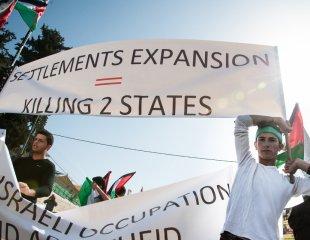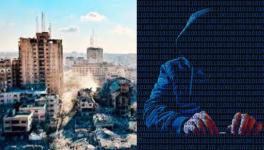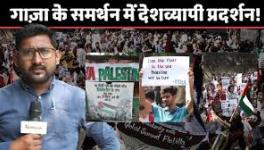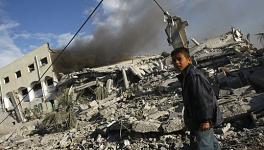American Media Continues to Ignore Historic Hunger Strike Underway

BETHLEHEM, OCCUPIED PALESTINIAN TERRITORIES, Photo Credit: Ryan Rodrick Beiler / Shutterstock.com
Since April 17, over 1,500 Palestinian political prisoners have been on hunger strike. Each time the political prisoners declare their intention to strike, Israeli authorities put them into solitary confinement. Attorneys for Addameer, a prisoner support organization, visited the Nafha, Hadarim and Asqlan prisons on April 25. Thabet al-Mardawi, a prisoner at Hadarim, told attorney Mona Naddaf that the Israeli prison guards had transferred prisoners into isolation. Nothing is more perilous to the human spirit than isolation. The hope is that isolation will break their spirits and detach the detainees from the outside world.
The "walls of segregation," writes the Kenyan novelist Ngugi wa Thiong’o of his time as a political prisoner in Kamiti Maximum Security Prison, would hound him. "The feeling of being alone would often steal into me, and I would be seized with the momentary panic of a man drowning in a sea of inexplicable terror." But the other political prisoners gave Ngugi social fellowship. Rumors from outside of solidarity and warm words from neighboring cells provided Ngugi with the strength to uphold his dignified politics.
This strike, the largest such demonstration inside Israel’s colonial prisons, is called the Freedom and Dignity hunger strike. It suggests that the people who sit in cold, lonely cells remain confident of their cause and of their victory. Dignity is important. It is the opposite of occupation.
Israel’s Gulag
Lawyers from Addameer visited Fadi Abu Attiya and Louay al-Mansi in the notorious Ofer prison on April 23. They report that the prisoners have been secluded in Section 11, where they are congested and ill-treated. The prison authorities have barred family visits and any recreation as well as the right to the group prayer on Friday. They have also banned the prisoners from washing their clothes. They are also denied drinking water.
The gap between the new rules for prisoners on hunger strike and the rest of the Palestinian political prisoners is narrow. An Amnesty International report released April 13 showed that the 6,500 Palestinian political prisoners are held without concern for international law. Palestinian Prisoners’ Affairs Commission spokesperson Hasan Abed Rabbo said that at least 1,100 prisoners were already prohibited from seeing their families. Even before the strike, at least 20 prisoners were in isolation. One 32-year-old prisoner from Hebron in Ketziot prison in the Naqab desert has only had one family visit in five and a half years. He told Amnesty he would join the hunger strike because he wanted to see his 70-year-old mother. "I have had one family visit while in jail," he said. "In 2006, my mother and father were able to visit me because my father was sick. He was 75 then. It was the last time I saw him. He died while I was in prison."
Najat al-Agha, age 67, lost her son Dia al-Agha, 43, to the Israeli prisons for the past quarter-century. He is in the Nafha prison in Mitzpe Ramon. She has not been able to see him. "I don’t know why I get rejected. I am 67 years old. What security threat am I to Israel? All I want is to see him and make sure he is well. I am scared of dying without seeing him."
Amnesty International’s Magdalena Mughrabi, who produced this report, said, "Israel’s ruthless policy of holding Palestinian prisoners arrested in the Occupied Palestinian Territories in prisons inside Israel is a flagrant violation of the Fourth Geneva Convention."
Peaceful Resistance
The most well-known Palestinian political prisoner is the Fatah leader Marwan Barghouti, who has been in prison since 2002. From his cell in Hadarim prison, Barghouti wrote a moving op-ed that was carried by the New York Times. In it, Barghouti writes that the Israeli system of occupation attempts to "break the spirit of the prisoners and the nation to which they belong, by inflicting suffering on their bodies, separating them from their families and communities, using humiliating measures to compel subjugation." The op-ed was published on Palestine Prisoners’ Day, which was the start of the hunger strike.
Barghouti, along with prisoner leader Karim Younis, was moved into solitary confinement in al-Jalama prison.
One of the curious features of colonial systems is that the authorities incarcerate those who call for non-violent resistance. By holding people like Barghouti, who has pledged to lead a non-violent struggle against Israeli occupation, the Israeli authorities denude Palestinian society of important sections of its leadership. It leaves the field open for bewilderment and rage, whose options are often violence. It is violence that allows Israel to claim that every action of its state is for security reasons.
Even Barghouti, often called the Palestinian Mandela, is painted with the brush of "terrorism." Israeli Public Security Minister Gilad Erdan said of the hunger strikers, "They are terrorists and incarcerated murderers who are getting what they deserve and we have no reason to negotiate with them." The silence of the prison, where many of Palestine’s leaders live, is preferable to Israel than the kind of mass unrest that these people could lead if they were free.
The Israeli authorities balked when the New York Times described Barghouti as a member of the Palestinian parliament. Israel claims Barghouti is a murderer, a charge contested by the Inter-Parliamentary Union which says Barghouti’s trial "failed to meet fair-trial standards." The editors of the Times added a note to appease the Israeli complaints.
Israel’s Intelligence and Transportation Minister Yisrael Katz went on Twitter to call for the death penalty for Barghouti. It is important to recognize that Israel’s court system has only once sent a man to death: the Nazi official Adolf Eichmann. In keeping with the cultural harshness of Katz, Israeli settlers put up their grills outside Ofer prison (near Ramallah) and barbecued meat to taunt the hunger strikers.
Nearby, Palestinian supporters of the hunger strike beat pots and pans. These empty cooking instruments, said Fattah Dawla, are to demonstrate the solidarity of Palestinian society with the hunger strikers. Flags with Barghouti’s image were ubiquitous. He is the symbol of this struggle.
Prisoner’s Document
In June 2006, at a low point of Palestinian politics, prisoners from across the political spectrum, from the communists to Hamas, signed a joint letter known as the Prisoner’s Document. The 18 points of the letter can be summed up by two main areas of agreement.
First, the prisoners agreed that the Palestinian people, as an occupied nation, have the right to "resist and to uphold the option of resistance of occupation by various means." The United Nations Declaration on the Granting of Independence in Colonial Countries (1960) set the standard for this position. It declared that "the process of liberation is irresistible." The right to resist occupation is enshrined in international law. To this end, the prisoners called for the creation of a Palestinian Resistance Front, made up of all parties, to coordinate resistance against the occupation.
Second, the prisoners argued that the most dangerous aspect for Palestine was the disunity of its politics, which produced disorientation of its national project. Unity of all the factions had to be manifest by their presence inside the Palestinian Liberation Organization (PLO). New Palestinian national goals had to be articulated by this unified spirit. The prisoners rearticulated what had already been agreed to by the factions at a Cairo meeting in March 2005.
No such unity emerged. Palestinian politics remained divided to its detriment. What brings the factions together is when the prisoners go on strike. This time again the groups have endorsed the prisoners. Their 13 demands are reasonable and run the gamut from installing telephones in the prisons to allowing detainees to sit for their high school (tawjihi) examinations. The prisoners want books and newspapers as well as an end to administrative detention and solitary confinement. Israel has snubbed its nose at even these basic demands. Whether the groups, from Hamas to Fatah, will take the deeper political demands of the prisoners seriously is to be seen.
Fatah has called for people to go to the solidarity tents across the West Bank. It has also called for a General Strike on April 27. Perhaps this dynamic will lead to the unity that is so essential for the Palestinian national project.
The broader questions raised by the prisoners remain alive. These are condensed into one general hope: for the unity of the Palestinian political factions toward a revitalized national project. These prisoners are beacons of light in a desolate political climate. Their voices are stifled. They are not being heard or taken seriously.
But they feel history is on their side. In this they echo the great Palestinian poet, Mahmoud Darwish: "Night is short-lived./The detention room does not last forever./Nor yet the links of chains."
Disclaimer: The views expressed here are the author's personal views, and do not necessarily represent the views of Newsclick.
Get the latest reports & analysis with people's perspective on Protests, movements & deep analytical videos, discussions of the current affairs in your Telegram app. Subscribe to NewsClick's Telegram channel & get Real-Time updates on stories, as they get published on our website.
























